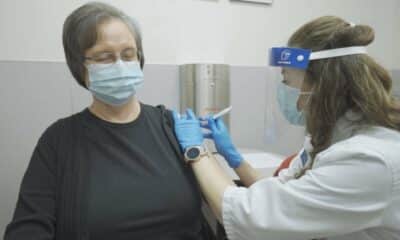Mississippi Today
Agency that doles out tax credit funds to private schools can’t say how the state money is being spent
House leaders, who say they want to bolster public education spending, have also proposed more than tripling the size of a program that sends millions in state funds to private schools even though information is not available on how the money is spent.
The state Department of Revenue is responsible for certifying the private schools that are eligible to receive funds through the Children's Promise Act. But, according to responses provided by the Department of Revenue, no information is available on how the funds are spent.
“DOR does not know how the funds were used,” the agency said in response to questions from legislators.
When asked the number of children served through the House-supported Children's Promise Act, DOR said, “This information is provided to DOR at the time of application … but is not updated annually. DOR does not maintain this information other than with the original request.”
In the original application, “DOR reviews the information provided and issues a letter ruling advising whether they qualify or not. The original request is covered under confidentiality statutes.”
The House's desire to greatly expand the size of the Children's Promise Act comes against the backdrop of many public school advocates being concerned about the House leadership's effort to rewrite the long-standing Mississippi Adequate Education Program that provides the state's share of funds for the basics to operate local schools.
While several elements of the House's plan have been lauded by public school advocates, many also have expressed concern that groups that support that rewrite plan also support sending public funds to private schools through vouchers. Before the House leadership's MAEP rewrite was made public, those pro-voucher groups unveiled a plan that was almost identical to the House proposal.
But supporters of the House plan have insisted that their proposal has nothing to do with vouchers. And, if to make that point, about the time the House began to pass its proposed rewrite of the funding formula, the bills filed by House leaders to enact a far reaching voucher program were allowed to quietly die.
But the Children's Promise Act remains alive in the legislative process, and there's little subtlety about private school supporters believing tax credits are more appealing to them than vouchers.
The Midsouth Association of Independent Schools, which includes most of the Mississippi private schools receiving the tax credit funds, said in a paper titled “The ABCs of school choice” that tax credits with revenue going to private schools were now considered more advantageous to them than vouchers.
“Freedom advocates, instead, look for policies like tuition tax credits and tax credits for donations to scholarship funds, to free up resources so that parents and donors can fund their own choices,” the MAIS paper reads. “Such policies expand choice for parents without shifting the burden for their children onto others.”
Under the Children's Promise Act, a person can make a donation to one of the private schools certified by the Department of Revenue and receive a dollar-for-dollar tax credit for up to 50% of the donor's state tax liability.
The maximum a private school currently can receive through the program is $405,000 annually.
The program was initiated in 2019 and touted as a mechanism to provide additional funds to nonprofits that care for foster children. But a provision to provide tax credits to private schools was tucked into the bill.
Currently, under the law, a total of $9 million annually in tax credit funds can be doled out to private schools. The original House plan under consideration this session would add another $6 million in tax credit benefits for the current year and $24 million for 2025.
Private schools are eligible for the tax credits if they educate:
- Children in the foster care system.
- Children who have a chronic illness or physical, intellectual, developmental or emotional disability.
- Children eligible for free or reduced meals.
Thus far, about 60 schools have received a cumulative $8.9 million in state tax breaks for the current calendar year. Those receiving the maximum of $405,000 this year include the Lamar School in Meridian and Wayne Academy in Waynesboro. Other schools receiving the most in state tax credit funds include: Heritage Academy in Columbus, receiving $402,900; Hartfield Academy in Flowood, receiving $397,800; Magnolia Heights in Senatobia, receiving $390,000; Jackson Academy, receiving $341,000; Madison-Ridgeland Academy, receiving $397,720; and Starkville Academy, receiving $403,744.
Private schools received similar amounts in previous years, according to the DOR website.
The law does not specify how many children must be served for the private school to receive the tax credit benefit.
Nancy Loome, executive director of The Parents Campaign, said technically if the school has one student with asthma, for instance, it could receive those funds.
Of course, according to the Department of Revenue, no one is checking to see if the schools are actually educating any children that would make them eligible for the tax credit benefit.
This article first appeared on Mississippi Today and is republished here under a Creative Commons license.
Mississippi Today
Renada Stovall, chemist and entrepreneur
Renada Stovall sat on the back deck of her rural Arkansas home one evening, contemplating life when she had a life-altering epiphany…
“I gotta get out of these woods.”
She heard it as clear as lips to her ear and as deep as the trees surrounding her property. Stovall's job as a chemist had taken her all over the country. In addition to Arkansas, there were stints in Atlanta, Dallas and Reno. But she was missing home, her parents and friends. She also knew, she needed something else to do.
“I thought, what kind of business can I start for myself,” said Stovall, as she watered herbs growing in a garden behind her south Jackson home. Some of those herbs are used in her all-natural products. “I know when I lived in Reno, Nevada, where it's very hot and very dry, there really weren't products available that worked for me, my hair, and my skin suffered. I've got a chemistry degree from Spelman College. I took the plunge and decided to create products for myself.”

In 2018, Stovall's venture led to the creation of shea butter moisturizers and natural soaps. But she didn't stop there, and in December 2022, she moved home to Mississippi and got to work, expanding her product line to include body balms and butters, and shampoos infused with avocado and palm, mango butter, coconut and olive oils.
Nadabutter, which incorporates Renada's name, came to fruition.

Stovall sells her balms and moisturizers at what she calls, “pop-up markets,” across the state during the summer. She's available via social media and also creates products depending on what of her ingredients a customer chooses. “My turmeric and honey is really popular,” Stovall added.
“The all-natural ingredients I use are great for conditioning the skin and hair. All of my products make you feel soft and luscious. The shea butter I use comes from West Africa. It's my way of networking and supporting other women. And it's my wish that other women can be inspired to be self-sufficient in starting their own businesses.”





This article first appeared on Mississippi Today and is republished here under a Creative Commons license.
Mississippi Today
On this day in 1954
MAY 17, 1954

In Brown v. Board of Education and Bolling v. Sharpe, the U.S. Supreme Court unanimously ruled that the “separate but equal” doctrine in Plessy v. Ferguson was unconstitutional under the 14th Amendment, which guaranteed equal treatment under the law.
The historic decision brought an end to federal tolerance of racial segregation, ruling in the case of student Linda Brown, who was denied admission to her local elementary school in Topeka, Kansas, because of the color of her skin.
In Mississippi, segregationist leaders called the day “Black Monday” and took up the charge of the just-created white Citizens' Council to preserve racial segregation at all costs.
This article first appeared on Mississippi Today and is republished here under a Creative Commons license.
Mississippi Today
Every university but Delta State to increase tuition this year
Every university in Mississippi is increasing tuition in the fall except for Delta State University.
The new rates were approved by the governing board of the eight universities, the Institutions of Higher Learning Board of Trustees, at its regular meeting Thursday.
The average cost of tuition in Mississippi is now $8,833 a year, a roughly 3% increase from last year. Students can expect to pay tuition ranging from $7,942 a year at Mississippi Valley State University to $10,052 a year at Mississippi State University.
In recent years, universities have cited inflation and rising insurance costs as reasons for the tuition increases. At Thursday's meeting, the board heard a presentation on how property insurance is becoming more expensive for the eight universities as Mississippi sees more tornadoes and storms with severe wind and hail.
READ MORE: Tuition increases yet again at most public universities
But it's an ongoing trend. Mississippi's public universities have steadily increased tuition since 2000, putting the cost of college increasingly out of reach for the average Mississippi family. More than half of Mississippi college students graduated with an average of $29,714 in student debt in 2020, according to the Institution for College Access and Success.
At Delta State University, the president, Daniel Ennis, announced that he will attempt to avoid tuition increases as the regional college in the Mississippi Delta undergoes drastic budget cuts in an effort to become more financially sustainable.
“We will resist tuition increases so that our most economically vulnerable students can continue to have access to the opportunities that a college degree can provide,” he wrote in a memo to faculty and staff on Monday. “We will move beyond basic survival and into a place where we have the capacity to take better advantage of our undeniable strengths.”
Delta State didn't increase tuition last year, either. Officials have been concerned the university is becoming too pricey for the students it serves.
Tuition for the 2024-25 academic year, by school:
- Alcorn State University: $8,105
- Delta State University: $8,435
- Jackson State University: $8,690
- Mississippi State University: $10,052
- Mississippi University for Women: $8,392
- Mississippi Valley State University: $7,492
- University of Mississippi: $9,612
- University of Southern Mississippi: $9,888
This article first appeared on Mississippi Today and is republished here under a Creative Commons license.
-
SuperTalk FM5 days ago
Martin Lawrence making 3 stops in Mississippi on comedy tour
-
Our Mississippi Home4 days ago
Beat the Heat with Mississippi’s Best Waterparks
-
Our Mississippi Home4 days ago
Charlie’s U-Pik: Opening Soon for the Summer Season
-
Mississippi News Video7 days ago
Local dentists offer free dental care in Amory
-
SuperTalk FM15 hours ago
State auditor cracking down on Mississippians receiving unemployment benefits
-
Kaiser Health News4 days ago
Medicaid ‘Unwinding’ Decried as Biased Against Disabled People
-
Mississippi News Video3 days ago
Jackson has a gang problem
-
Mississippi Today7 days ago
On this day in 1968








































